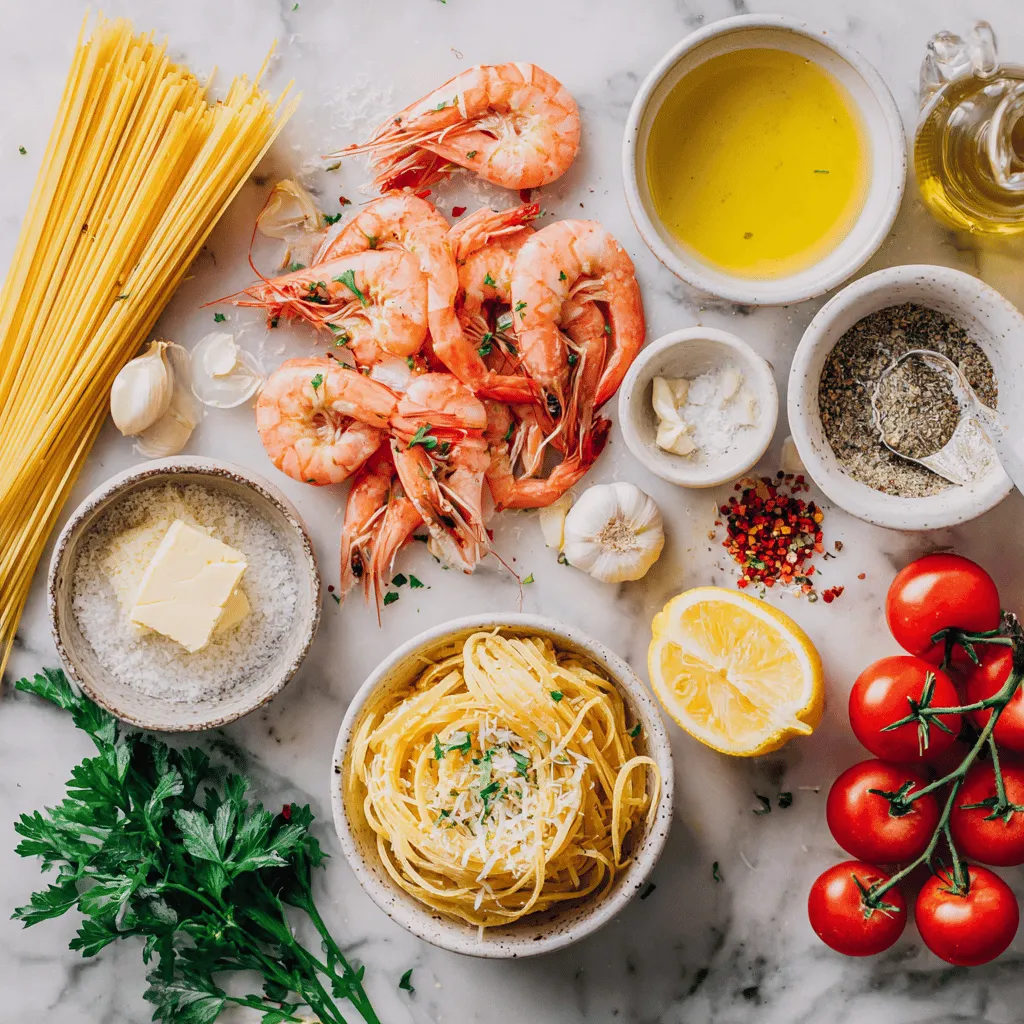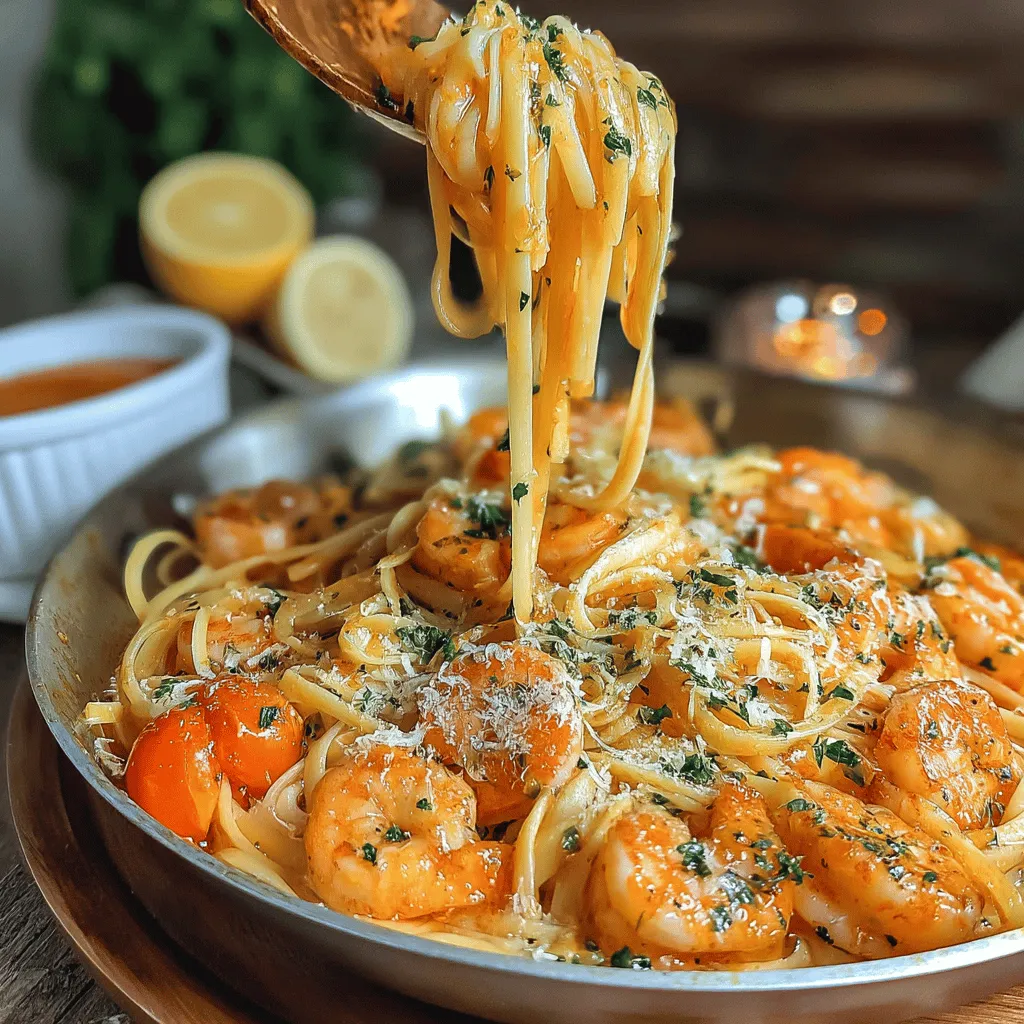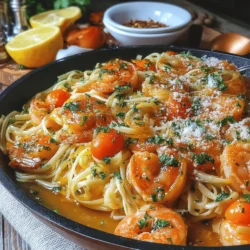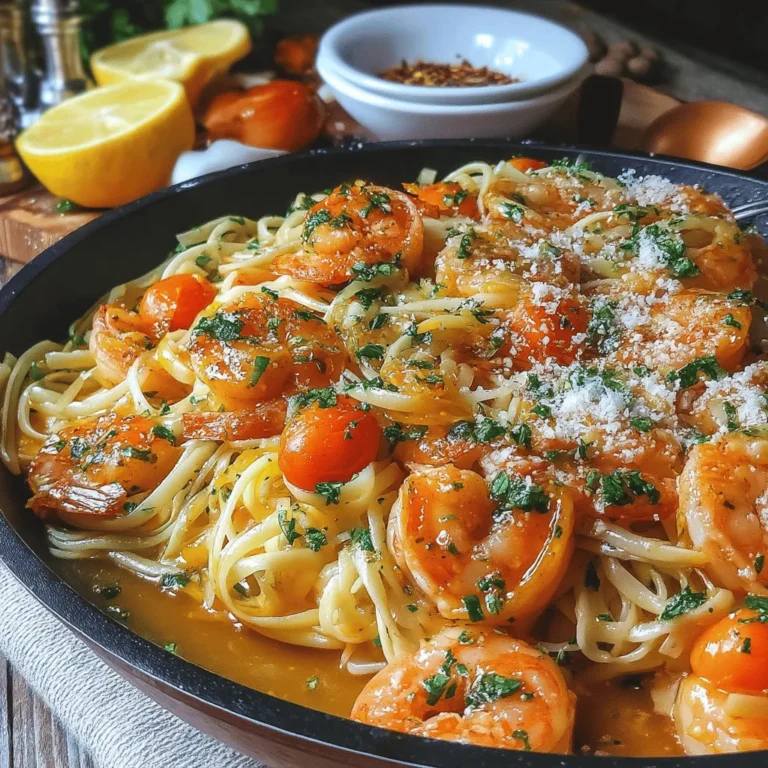Introduction
Shrimp scampi is a beloved dish that combines succulent shrimp with a rich, buttery sauce, typically served over pasta. Its origins can be traced back to Italian-American cuisine, and it has become a favorite in homes and restaurants alike. The beauty of shrimp scampi lies not only in its delicious flavors but also in its simplicity and quick preparation.
Using fresh ingredients is crucial for achieving the best flavor in this dish. The combination of fresh shrimp, aromatic garlic, and zesty lemon creates a vibrant taste that leaves a lasting impression. In this article, we will explore the Skillet Garlic Shrimp Scampi Delight recipe, which is not only easy to prepare but also bursting with flavor.
Recipe Overview
– Total Time: 30 minutes
– Servings: 4
– Difficulty: Easy
Ingredients
– 1 pound large shrimp, peeled and deveined
– 8 ounces linguine or spaghetti
– 4 tablespoons unsalted butter
– 2 tablespoons olive oil
– 6 cloves garlic, minced
– ½ cup dry white wine
– Juice and zest of 1 lemon
– ½ teaspoon red pepper flakes (adjust to taste)
– Salt and black pepper, to taste
– ¼ cup fresh parsley, chopped
– 1 cup cherry tomatoes, halved

Instructions
1. Bring a large pot of salted water to a boil. Add the linguine or spaghetti and cook according to package instructions until al dente. Reserve ½ cup of the pasta water, then drain the pasta.
2. In a large skillet over medium heat, melt the butter and olive oil together.
3. Add the minced garlic to the skillet and sauté for about 1 minute, or until fragrant. Be careful not to let it burn.
4. Pour in the dry white wine and increase the heat to high. Let it simmer for 2-3 minutes to reduce slightly.
5. Add the shrimp to the skillet and season with salt, black pepper, and red pepper flakes. Cook for about 2-3 minutes, or until the shrimp turn pink and opaque.
6. Stir in the lemon juice, lemon zest, halved cherry tomatoes, and cooked pasta. Toss everything together, adding reserved pasta water as needed to create a cohesive sauce.
7. Remove from heat, sprinkle with fresh parsley, and serve immediately.
Understanding Shrimp Scampi
History and Origins of Shrimp Scampi
The dish known as shrimp scampi has roots in Italian cooking, specifically from the coastal regions where seafood is abundant. Traditionally, the term “scampi” refers to a type of langoustine, but it has evolved to represent the preparation of shrimp in a garlic and butter sauce.
Common Variations Across Different Cultures
While the classic recipe remains popular, variations exist worldwide. In the Mediterranean, for instance, you might find the addition of tomatoes or herbs, while in the U.S., creamy versions have gained traction. Each variation reflects local ingredients and culinary traditions.
Nutritional Benefits of Shrimp and Other Ingredients Used in the Recipe
Shrimp is a low-calorie source of protein, rich in essential nutrients like selenium and vitamin B12. Combined with healthy fats from olive oil and the antioxidants found in garlic and tomatoes, this dish is not only delicious but also nutritious. The lemon and parsley also contribute vitamins and enhance the overall health benefits.
Ingredients Breakdown
Large Shrimp: Importance of Choosing Fresh, High-Quality Shrimp
When preparing shrimp scampi, selecting large, fresh shrimp is crucial for a satisfying texture and flavor. Fresh shrimp should have a mild scent of the sea and firm flesh.
Linguine vs. Spaghetti: Which Pasta Works Best and Why
Both linguine and spaghetti work well for shrimp scampi, but linguine’s flat shape helps hold the sauce better. The choice ultimately depends on personal preference.
Butter and Olive Oil: Flavor Profiles and Health Considerations
The combination of butter and olive oil creates a rich and flavorful base for the sauce. While butter adds creaminess, olive oil provides a lighter taste and healthy fats.
Garlic: The Aromatic Foundation of the Dish
Garlic is the aromatic star of shrimp scampi, infusing the dish with its unmistakable fragrance and flavor. It’s essential to sauté it just right to avoid bitterness.
Dry White Wine: Role in Flavor Enhancement and Alternatives
Dry white wine adds acidity and depth to the sauce, balancing the richness of the butter. If you prefer not to use wine, chicken or vegetable broth can be a suitable substitute.
Lemon: Importance of Zest and Juice for Brightness
Lemon juice and zest brighten the dish and enhance the flavors of the shrimp and garlic. The acidity cuts through the richness, making each bite refreshing.
Red Pepper Flakes: How to Adjust for Heat Preference
Red pepper flakes add a touch of heat to the dish. Adjust the amount to suit your taste, or omit them altogether for a milder flavor.
Fresh Parsley and Cherry Tomatoes: Adding Color and Freshness
Fresh parsley not only adds color but also a burst of freshness at the end of cooking. Cherry tomatoes contribute a sweet and juicy element that complements the shrimp beautifully.

Sautéing the Shrimp
Tips for Perfect Shrimp Cooking: Avoiding Overcrowding
When sautéing shrimp, it’s crucial to avoid overcrowding the skillet. Overcrowding can lead to steaming rather than searing, resulting in a less flavorful dish. Cook the shrimp in batches if necessary, ensuring each piece has enough space to develop a golden crust.
Signs of Perfectly Cooked Shrimp
Perfectly cooked shrimp should be opaque and firm to the touch. They typically turn a lovely pink color. Keep an eye on them as they cook; shrimp only require a few minutes per side, depending on their size. Overcooked shrimp become rubbery, so it’s essential to remove them from heat promptly.
Preparing the Garlic Sauce
Techniques for Sautéing Garlic Without Burning
Garlic can easily burn and become bitter if cooked at too high a temperature. To avoid this, add minced garlic to the skillet after the shrimp has been removed and the heat has been reduced. Allow the garlic to sauté for just 30 seconds to a minute until fragrant.
Importance of Deglazing the Skillet for Flavor
Deglazing the skillet after cooking shrimp adds depth to your garlic sauce. Simply pour in a splash of white wine or broth and use a wooden spoon to scrape up any bits stuck to the bottom. This technique captures all those delicious flavors and incorporates them into the sauce.
Adding Wine and Lemon
How to Properly Simmer and Reduce the Sauce
Once you’ve deglazed the skillet, allow the wine to simmer for a few minutes. This process reduces the liquid and concentrates the flavors, creating a rich sauce that complements the shrimp beautifully. Aim for a reduction of about half the initial volume.
Balancing Acidity and Richness Through Lemon Juice and Zest
Adding freshly squeezed lemon juice and zest at the end of cooking enhances the dish’s brightness. The acidity balances the richness of the butter and wine, making each bite refreshing. Adjust the amount of lemon to your preference for a more pronounced citrus flavor.
Combining Ingredients
Techniques for Tossing Pasta and Shrimp Together for Even Coating
To ensure the pasta and shrimp are evenly coated with the sauce, use tongs or a large fork to gently toss them together. This method prevents the pasta from breaking and ensures every piece is enveloped in the delicious garlic sauce.
Adjusting Sauce Consistency with Reserved Pasta Water
If your sauce appears too thick, add a splash of reserved pasta water to loosen it. The starch in the water helps bind the sauce to the pasta, enhancing the overall texture.
Plating and Serving Suggestions
Presentation Tips for an Appetizing Dish
For a visually appealing plate, twirl the pasta into a nest and place the shrimp on top. Drizzle the garlic sauce over the dish and consider using a sprinkle of fresh parsley for a pop of color.
Suggested Garnishes and Serving Options
Garnish your Skillet Garlic Shrimp Scampi with freshly chopped parsley or basil for an aromatic touch. Serve with crusty bread to mop up the sauce, or pair it with a light salad for a balanced meal.
Pairing Suggestions
Ideal Side Dishes and Salads That Complement the Dish
Consider serving your shrimp scampi with a side of garlic bread or a simple arugula salad dressed with lemon vinaigrette. These options enhance the meal without overpowering the delicate flavors of the shrimp.
Recommended Wine Pairings to Enhance the Dining Experience
A crisp white wine, such as Sauvignon Blanc or Pinot Grigio, pairs wonderfully with shrimp scampi. The acidity in the wine complements the lemon and garlic, elevating the overall dining experience.
Possible Variations for Dietary Preferences
For a gluten-free option, substitute traditional pasta with zucchini noodles or gluten-free pasta. If you’re looking for a low-carb variation, serve the scampi over riced cauliflower for a light and satisfying meal.
Conclusion
In summary, Skillet Garlic Shrimp Scampi is a delightful dish that balances rich flavors with bright acidity, making it perfect for any occasion. Its straightforward preparation allows you to whip it up for a quick weeknight dinner or a special gathering with friends and family. The versatility of shrimp scampi makes it a staple in modern cuisine, inviting endless variations and pairings. Enjoy this dish and savor the vibrant flavors it brings to your table!


